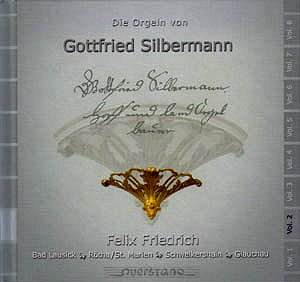This
recording, the second in a series of eight recordings published
by Querstand, features works performed by Felix Friedrich on four
different Gottfried Silbermann organs. 2003 sees the 250th anniversary
of the death of Silbermann, a renowned organ builder, and one
whose instruments were favoured by Johann Sebastian Bach.
Who
better to represent the music of Silbermann's time than Johann
Sebastian Bach? And what better work than the choral and variations
set Partita "Sei gegrüßet, Jesu gütig"? This piece
gives Friedrich the opportunity to show off the many sounds the
Bad Lausick organ can offer. This instrument, which is not overly
imposing, can be both forceful and subtle, and its registrations
range from powerful to sublime. The opening choral is played with
energy, and the third with the lightest touch and sounds. All
in all, the performance of this piece is an excellent presentation
of both music and organ.
The
sonata by Georg Andreas Sorge, played on the Rötha, St. Marien
organ, is very much like one of Bach's trio sonatas, and Friedrich
plays it in a lively, rapid tempo. Its playful third movement
is almost like Mozart, and the closing fugue, though simple, does
justice to this organ which has a bright sound.
The
variations on Ah, vous dirai-je, maman, performed on the Schweikershain
organ, are disappointing. This is a richly resonant organ, with
a wide palette of tones. Such a simple piece disappoints on a
disc like this. I would have liked to hear something more potent
- a fugue, perhaps - than such a juvenile work. The brief Bach
choral is excellent, but leaves me wishing that this instrument
had been used for more serious music.
Finally,
the Glauchau organ has a deep bass sound, and resounds strongly.
The Bach prelude and fugue is ideal for this instrument. However
it underscores the lack of truly imaginative music on this disc.
This is the only "real" fugue on the recording, and the organ
is a great instrument for fugues, especially those by Bach. The
twelve organ pieces by Christian Gotthilf Tag are a bit of a letdown;
this fine organ deserves better. At the end, I cannot help but
decry the poor match between this instrument and the music played
on it. This is the best sounding organ on this disc, and it would
have been wonderful to hear a Bach trio sonata, or one of the
great toccata and fugue sets. Alas, superficial music is all you
get.
This
recording is a disappointment. Four great organs, well recorded,
but with music that is not up to the quality of the instruments.
The presentation is excellent: the disc is held in a small "hardcover"
book, with copious notes and photos. Organ enthusiasts will want
to snap this up, though casual listeners may find the music lacking
in substance and imagination.
Kirk
McElhearn


![]() Felix Friedrich, organs
Felix Friedrich, organs
![]() QUERSTAND VKJK 0207
[69.41]
QUERSTAND VKJK 0207
[69.41]